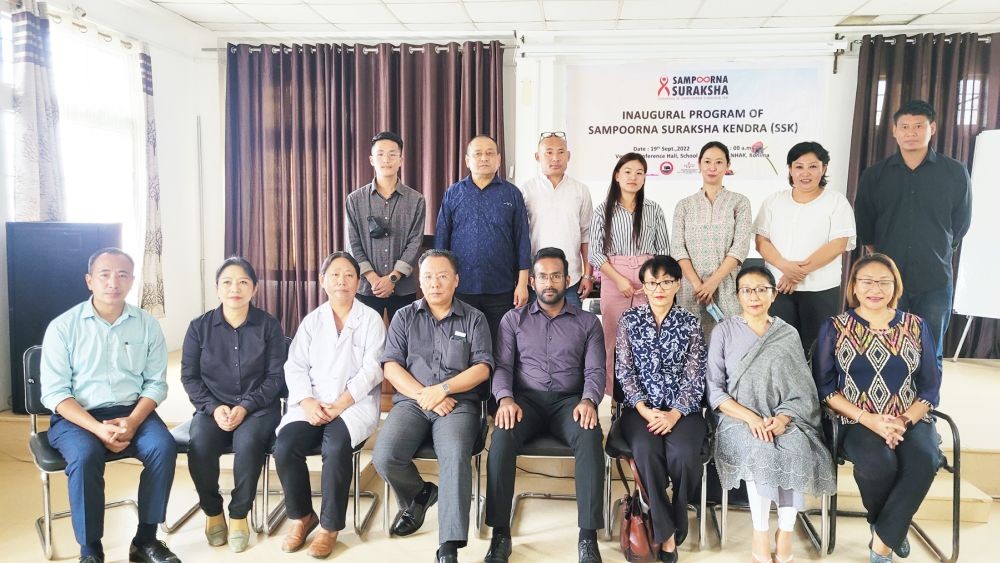Dignitaries during the launching of Sampoorna Suraksha Kendra held in Kohima on September 19. (Morung Photo)

Our Correspondent
Kohima | September 19
Nagaland has been connected with Sampoorna Suraksha Strategy (SSS) programme which innovative cost-effective approach for HIV prevention among ‘at risk’ populations, to prevent new HIV infections and avert AIDS-related deaths.
To carry the SSS activities forward in the state, the Nagaland State AIDS Control Society (NSACS) under the auspice of National AIDS Control Organization (NACO) has done the formality of launching Sampoorna Suraksha Kendra (SSK) at Naga Hospital Authority Kohima (NHAK) on September 19.
Delivering the keynote address at the launching ceremony at School of Nursing, Kohima, NSACS Project Director Dr Akuo Sorhie informed that SSS is a new ‘Immersion Learning Model’ to reach to the population ‘at risk’ for HIV and STIs under NACO, Ministry of Health & Family Welfare, Government of India and supported by Global Fund Grant 2021-22.
As a signatory to United Nations' Sustainable Development Goals (SDG), India is committed to ending HIV/AIDS as a public health threat by 2030.
The vision is to accelerate the national HIV response by reaching out the population ‘at risk’ for HIV and STIs towards achieving the fast track 95-95-95 target and reducing the HIV and STI/RTI infection.
As per HIV estimations 2019, annual new HIV infections have declined in India by 37% between 2010 and 2019. While this is significantly higher than the global average of 23%, it is evident that there is a need to further arrest the spread of HIV, Dr Sorhie said.
New infections among 'at risk' individuals who do not identify themselves as part of any High-Risk Group (HRG) are still being missed out in the routine coverage and SSS is targeted towards these “at risk” individuals, to help them stay negative, and stay healthy, she said.
Comprehensive Package Model of service delivery for ‘at risk’ population
The NSACS project director said that ‘at risk’ population will avail a Comprehensive Package Model of service delivery at SSK. The service package includes; set of services customized as per clients' needs, with strong linkages and referrals with other services and social security schemes, rigorous outreach and follow ups with clients, leveraging virtual platforms through various apps and other sources, including but not limited to Hep B, Hep C, STIs including syphilis, mental health, reproductive and child health, hormone post-surgery services, government welfare services, legal services etc.
SSS may serve as a hybrid model, integrating physical and virtual services such as social media and other virtual platforms, including PPP models with private providers and other social networking/dating/informational platforms for e-referrals, reinvigorate NACO helpline 1097 to make it attractive to younger populations such as adolescents and youth, as well as populations that have high risk and who prefer anonymity in accessing services, Dr Sorhie said.
Kohima has been selected among the 75 Phase-I districts for the financial year 2021-22 in the country, to roll out SSS Implementation followed by an additional 75 centres in phase 2 during the period of 2021-24 on the basis of top HIV positivity ranking, co-infection rates, risk behaviour and usage of family planning commodities.
In addition to the results from data analysis, states/districts from Northeast Region (Mizoram and Nagaland) were selected on the basis of geography and high percentage of high-risk behaviour population, she said.
Under SSS, existing ICTC/DSRC facilities under NACP are being re-modelled into Sampoorna Suraksha facilities and will be implemented through the existing NACP facilities i.e., ICTCs or DSRCS and SSK team will work closely with the DSRC/ICTC and other facilities of NACO in the district.
Dr Sorhie said that Integrated Counselling & Testing Centre (ICTC) NHAK has fulfilled the criteria laid down by NACO to roll out SSS in Nagaland whereas Nagaland Users’ Network, a Targeted Intervention (TI) NGO under NACO/NSACS has been appointed as the agency for supporting the implementation of SSS in Nagaland.
Call for coordinated effort for success of SSS
In his remarks, Kohima Deputy Commissioner, Shanavas C stressed on the need to put coordinated efforts for successful implementation of the programme in the state.
He said that coordinated efforts of the medical department, NSACS with school education department, higher education and technical education are very important for ensuring behaviour change and reducing the stigma. DC Shanavas also stressed on the need to reach out to the younger generation in schools and colleges on quality of life. He maintained that coordinated effort is required to identify and address the high risk group for long lasting impact. From district administration side, he assured fullest support in reaching out to high risk group.
Dr Sendimeren Aonok, Medical Superintendent, NHAK and Dr Thorusie Katiry, Mission Director, National Health Mission, Nagaland also spoke at the programme.
The programme was chaired by Dr M Nukshisangla Jamir, Deputy Director (BDS/SSS Nodal Officer), NSACS while vote of thanks was proposed by Dr Bernice Thaprü, Joint Director, Targeted Intervention, NSACS.






